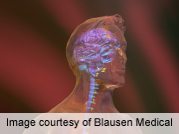
MONDAY, Oct. 8 (HealthDay News) — U.S. health officials said late Monday that as many as 13,000 people may have received steroid shots from the suspected source of a national meningitis outbreak.
However, it’s not known how many of the shots were contaminated with the fungus that causes this rare type of meningitis. So it’s not clear how many people might be at risk for infection, the Associated Press reported.
The 13,000 figure includes not only people who got the shots for back pain — and are considered most at risk — but also patients who got injections in other places, such as knees and shoulders.
There was no breakdown on the number of back injections, said Curtis Allen, a spokesman for the Centers for Disease Control and Prevention. Those injected in their joints are not believed to be at risk for meningitis, he added.
Meanwhile, the number of meningitis cases linked to the apparently contaminated steroid injections has risen to 105 in nine states, and the number of deaths has increased by one to eight, U.S. health officials reported earlier Monday.
All of the patients were thought to be injected with methylprednisolone acetate, a steroid drug commonly used for back pain that investigators suspect was contaminated with a fungus usually found in leaf mold, according to the CDC.
Health officials in 23 states that received shipments of the steroid are still trying to track down patients who got the injections.
On Monday, the CDC offered the following state-by-state breakdown of cases: Florida: 4 cases; Indiana: 11 cases; Maryland: 5 cases, including 1 death; Michigan: 21 cases, including 2 deaths; Minnesota: 3 cases; North Carolina: 2 cases; Ohio: 1 case; Tennessee: 35 cases, including 4 deaths; Virginia: 23 cases, including 1 death.
The drug was manufactured by a specialty pharmacy, New England Compounding Center of Framingham, Mass., which last month voluntarily recalled three lots of the steroid. It has since shut down operations and stopped distributing its products, health officials said.
On Saturday, the pharmacy said it was voluntarily recalling all of its products, calling the decision a precautionary measure. The company said there were no signs that any of its other products have been contaminated, the AP reported.
The CDC last week released a list of the approximately 75 health-care facilities that received contaminated product.
U.S. health officials said they expect to see more cases of the rare type of meningitis, which is not contagious, because symptoms can take a month or more to appear.
All of the infected patients are thought to have received the medication from the Massachusetts pharmacy, said Dr. Benjamin Park, a medical officer with the CDC’s National Center for Emerging and Zoonotic Infectious Diseases.
Infected patients have developed a variety of symptoms approximately one to four weeks following their injection. Symptoms include fever, new or worsening headache, nausea, and “new neurological deficit [consistent with deep brain stroke],” the CDC said in a news release. Some of these patients’ symptoms were very mild in nature. Cerebrospinal fluid from these patients has shown findings consistent with meningitis, the agency said.
The CDC said the New England Compounding Center last month voluntarily recalled the following lots of methylprednisolone acetate:
- Methylprednisolone Acetate (PF) 80 mg/ml Injection, Lot #05212012@68, BUD 11/17/2012
- Methylprednisolone Acetate (PF) 80 mg/ml Injection, Lot #06292012@26, BUD 12/26/2012
- Methylprednisolone Acetate (PF) 80 mg/ml Injection, Lot #08102012@51, BUD 2/6/2013
Doctors should immediately contact patients who have had an injection from any of the three lots to see if they’re having any symptoms, the CDC said.
Although all cases of meningitis detected so far occurred after injections with products from these three lots, the CDC and the U.S. Food and Drug Administration recommended, “out of an abundance of caution,” that health-care professionals not use any products produced by the New England Compounding Center until more information is available.
Patients who have had a steroid injection since July, and have any of the following symptoms, should talk to their doctor as soon as possible:
- Worsening headache,
- Fever,
- Sensitivity to light,
- Stiff neck,
- New weakness or numbness in any part of your body,
- Slurred speech.
The steroid procedure — called lumbar epidural steroid injection — is a common treatment for back pain that has not responded to medicines, physical therapy or other nonsurgical treatments.
“From the time of the injection until symptoms appear may be a month or more,” said Dr. William Schaffner, an infectious disease expert at Vanderbilt University Medical Center in Nashville.
But he added that not everyone who got the steroid injection will develop meningitis — an inflammation of tissue surrounding the brain and spinal cord — but it’s hard to know how many will.
Also, he and other experts said some of the symptoms associated with this rare form of meningitis are unusual.
“One of the things we are just learning about these patients is that they can present with minor stroke-like symptoms, which would include slurred speech and unsteady gait,” Schaffner said.
Stroke is not usually associated with either bacterial or viral meningitis, said another expert, Dr. Pascal James Imperato, a dean at the School of Public Health of SUNY Downstate Medical Center in New York City.
Infected patients must receive intravenous drugs in a hospital setting, Imperato said.
Treatment can take weeks if not months, because these infections are difficult to treat, Schaffner explained. And the drugs can have severe side effects, including affecting kidney function, he added.
Although the steroid is the primary target of investigation, health officials haven’t ruled out the antiseptic and anesthetic used during the injections as a possible cause of the outbreak, experts said.
Dr. Marc Siegel, an associate professor of medicine at NYU Langone Medical Center in New York City, said the meningitis outbreak underscores the importance of sterilization procedures in intravenous and intramuscular shots.
“I believe that this could have been prevented by more vigilance,” Siegel said.
However, he added that he doesn’t expect the number of infected patients to balloon in the near future.
“This is not going to be an epidemic, because the fungus is weak and there isn’t a reservoir,” Siegel said. “But there will continue to be isolated cases over the next several weeks because of the long incubation period.”
Specialty manufacturers like New England Compounding Center make drug solutions that aren’t available from the big pharmaceutical companies, but they aren’t subject to the same rigorous safety standards, such as FDA oversight.
More information
The U.S. National Library of Medicine has more about injections for back pain.

